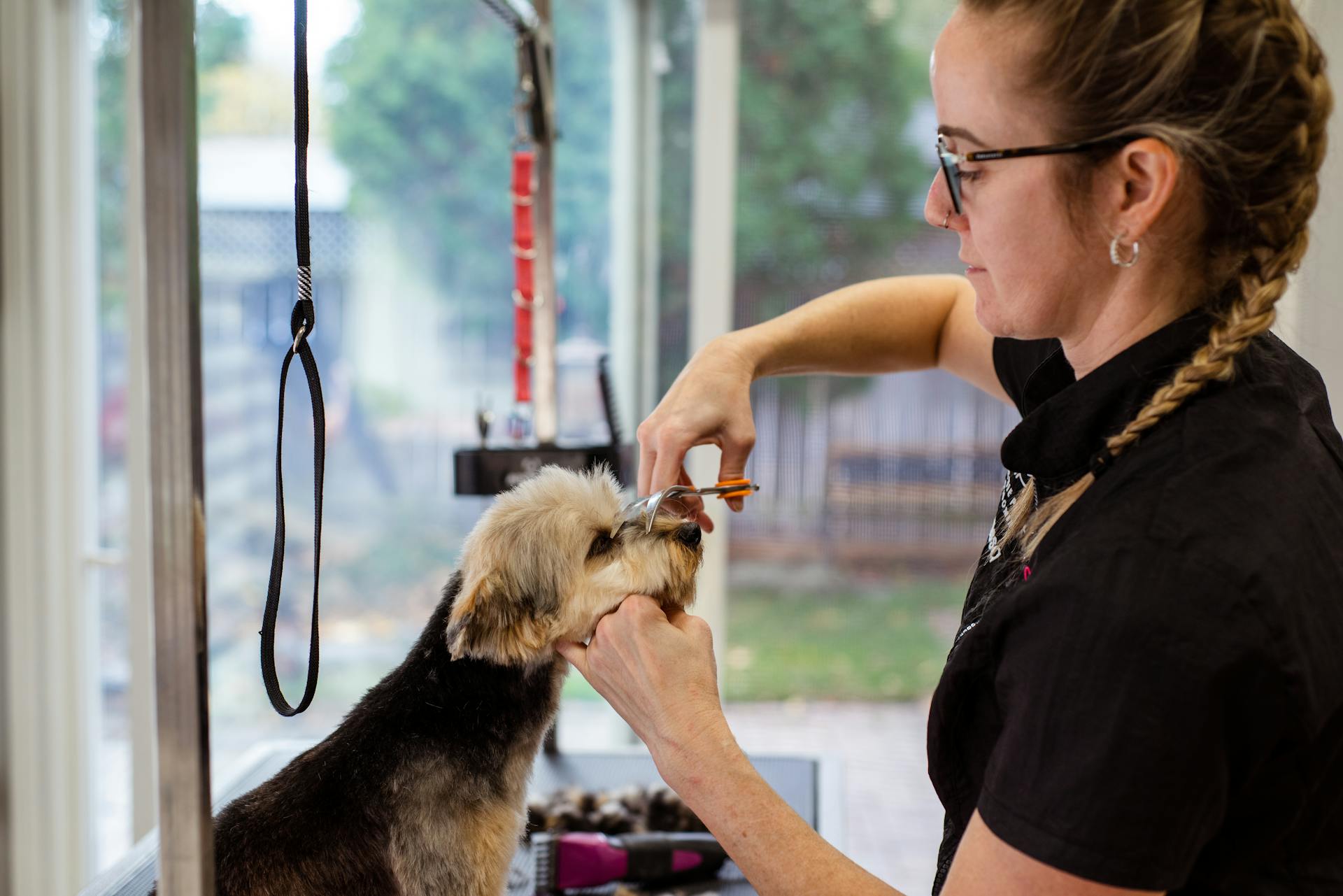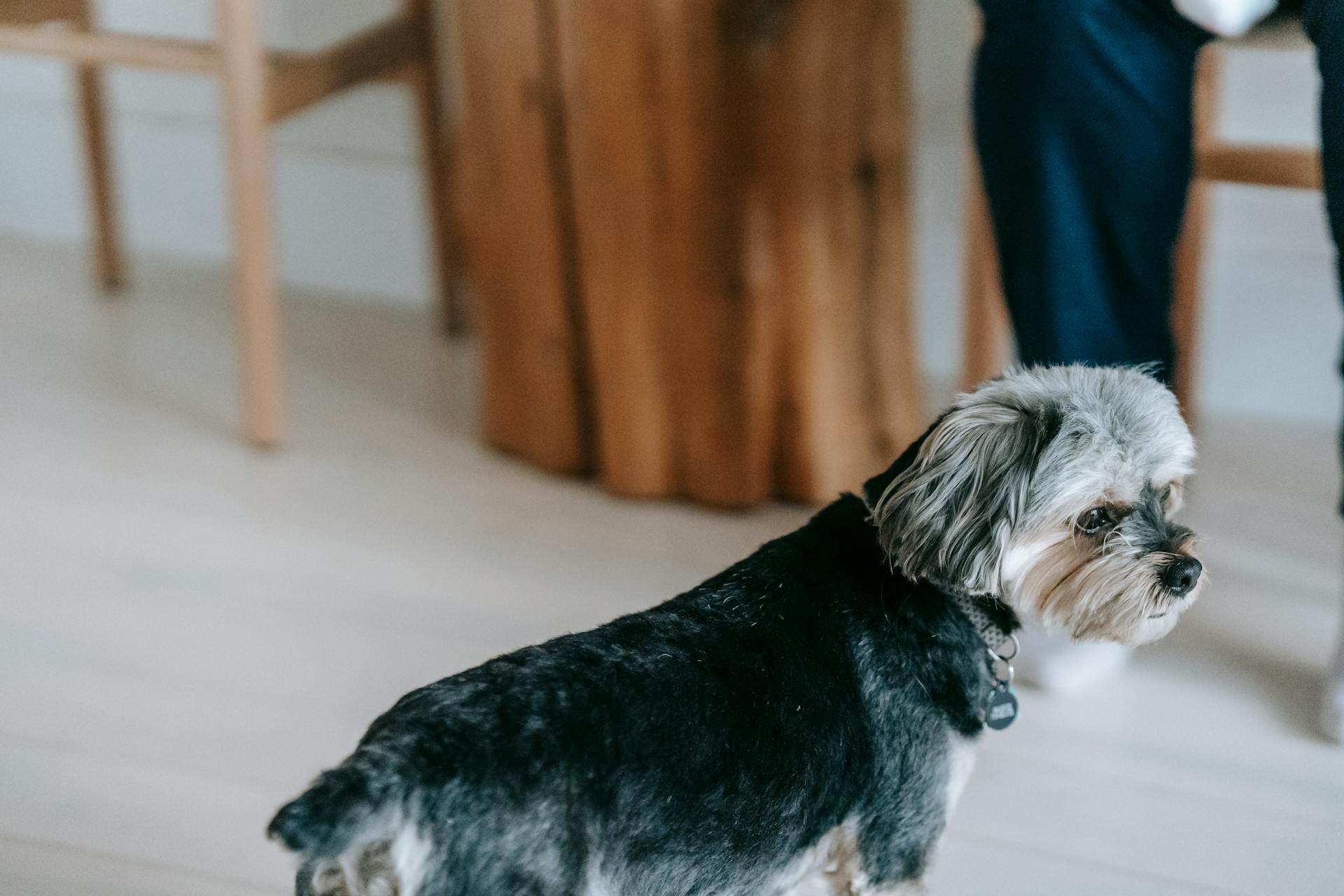
The Morkie dog breed is a delightful mix of Yorkshire Terrier and Maltese characteristics.
Morkies are small dogs, typically weighing between 4-8 pounds (2-3.5 kg) and standing about 6-10 inches (15-25 cm) tall.
They have a silky, hypoallergenic coat that requires regular grooming to prevent matting and tangling.
Their friendly nature makes them excellent companions for families with children or singles who want a low-maintenance pet.
Puppies
A Morkie puppy has an irresistible charm and a playful and curious attitude.
They will spend much of the day exploring your home and constantly craving attention. They will be naturally friendly but will need to spend plenty of time with people and other animals, so they will feel comfortable around them as adults.
It's essential to socialize your Morkie puppy from an early age by visiting various locations, such as parks or pet stores, to help them become confident in new environments. This is also when you want to start getting them into training and grooming routines.
A high-quality toy breed kibble for puppies would be advisable as a food option, but it's always best to consult with your vet to ensure you're making the right choice for your puppy's specific needs.
Personality and Temperament
Morkies are confident dogs who love their families. They thrive on interaction and will constantly seek out your affection.
As an affectionate breed, Morkies form strong bonds with their owners. This means they'll be right by your side most of the time, but may not do well if left alone for extended periods.
Morkies are also expert problem solvers and quick learners. They're easy to train, even for beginners, thanks to their eager-to-please attitude.
Here's a rundown of some key personality traits:
- Affectionate: Loves attention and forms strong bonds with owners.
- Loyal: Very devoted to their family and protective of their loved ones.
- Social: Thrives on human interaction, and enjoys being around people.
- Alert: Makes a good watchdog, quick to bark at unfamiliar sounds or people.
- Fearless: Often bold and confident, despite their small size.
- Curious: Loves to explore and investigate surroundings.
As you can see, Morkies are quite the package deal - but remember that their small size does warrant extra caution when it comes to young children and other pets.
Family-Friendly Dogs?
Morkies can make wonderful family dogs if you're willing to put in the time and effort to teach them new tricks and provide proper care.
Their friendly nature often makes them good companions for other pets, but be aware that they have a strong prey drive and may chase after smaller animals like mice. They can get along well with cats and other dogs if socialized properly from an early age.
Broaden your view: Teacup Morkie Dogs Full Grown
If you do have young children, it's essential to teach them how to handle a dog gently and respectfully, as Morkies are small and vulnerable to injury. With patience and proper training, they can be great family pets.
Their stubborn or high-strung personality may come out if they take after their Yorkshire Terrier parent, so be prepared for some challenges along the way.
Pet Compatibility
Morkies can get along well with cats and other dogs if they're socialized properly from an early age.
Their friendly nature makes them good companions for other pets, but be aware that they have a strong prey drive and may chase smaller animals like mice. They might also get injured while playing with larger dogs due to their small size, so it's essential to supervise them during playtime.
Morkies are generally excellent companion dogs thanks to their affectionate, playful, and social nature, making them a great match for families and individuals who can provide plenty of attention and affection.
Diet Requirements
When choosing a food for your Morkie, look for high-quality dog food that has real meat like chicken or turkey listed as the first ingredient.
To ensure you're feeding your Morkie correctly, follow the portioning recommendations on the package carefully, as it will be easy for such a small dog to put on weight. Limit your treats to no more than 10% of their total daily calories.
Morkies need a protein-rich diet for muscle development and maintenance, so ensure that the food includes high-quality protein sources like chicken, turkey, fish, or lamb.
A balanced diet should also include healthy fats, such as omega-3 and omega-6 fatty acids, which support a shiny coat, healthy skin, and proper brain function. Wholesome carbohydrates, like sweet potatoes, rice, or barley, provide energy for your Morkie.
Here are some essential nutrients to look for in your Morkie's food:
- Protein
- Fats (omega-3 and omega-6 fatty acids)
- Carbohydrates (sweet potatoes, rice, or barley)
- Vitamins and Minerals (calcium, phosphorus, and antioxidants)
To avoid digestive issues, feed your Morkie high-quality kibble, preferably tailored for toy or small breeds. A feeding schedule of 2-3 meals throughout the day should be adequate, but please check with your vet to verify.
Because Morkies are prone to putting on extra weight, which can aggravate hypoglycemia and other medical concerns, free feeding is not recommended.
Exercise
Exercise is a must for your Morkie.
You'll want to set aside 30–60 minutes each day to play with your Morkie and keep them healthy and happy. You can break up the time into several sessions, going for short walks, playing fetch, and doing indoor interactive games will help them stay more active.
Morkies require a certain degree of daily exercise to help get some of their hyper energy out. They don't handle intense heat or cold very well, so it's best to walk your Morkie in an interior apartment or home hallway during inclement weather.
Short strolls in the park for about an hour a day are usually enough for them. Many Morkies are very playful with other small dogs and can get a lot of exercise through playing with them.
You should keep an eye on the other animals and people around you to make sure that your small dog is not accidentally hurt by careless strangers or larger dogs. Walking your Morkie with a harness rather than a collar will help reduce the risk of any throat or neck injuries.
Brushing:
Brushing is a must for Morkies. You'll need to brush their fur regularly to keep it looking neat and prevent knots and tangles.
Regular brushing will also help distribute skin oils, which can make their coat shiny and healthy-looking. A high-quality dog-specific shampoo every few weeks will complement your brushing efforts.
Their non-shedding coat requires more maintenance than some breeds, but this makes them a good option for people with mild allergies. Regular grooming keeps them looking their best and prevents issues like matting and infections.
The frequency of trimming depends on the Morkie's inherited coat type - either Maltese or Yorkie silky coat. Brushing should be done regularly to prevent matting, especially if they inherit more of the Maltese's coat.
Size & Physical Traits
Morkies are small dogs, weighing 7 to 13 pounds.
Their compact build is a result of their Yorkshire Terrier and Maltese parents blending together. They typically stand 7 to 10 inches at the shoulder.
A Morkie's head is rounded with expressive dark eyes that give them a lively look. Their ears can vary in style, sometimes standing erect or flopping over.
Health Issues
As a Morkie owner, it's essential to be aware of the potential health issues that can affect your furry friend.
Like many small dog breeds and mixed breeds, Morkies can be prone to dental problems due to their small mouths, which can lead to overcrowding and tooth decay.
Morkies are also susceptible to patellar luxation, a condition where the kneecap dislocates or moves out of its normal location. In most cases, the kneecap shifts in and out of place, but severe cases may require surgery.
Some common health concerns for Morkies include hypoglycemia (low blood sugar), especially in puppies or very small adults, which can be characterized by weakness, lethargy, tremors, and sometimes seizures. Eye issues, such as progressive retinal atrophy and cataracts, are also possible in Morkies.
Here are some common health problems that may affect your Morkie:
- Collapsed trachea: A condition where the trachea begins to collapse and flatten on itself, making breathing difficult.
- Reverse sneezing: Caused by minor irritation of the throat through pollen, eating too rapidly, or other such things, it's characterized by a gagging cough.
- Hypoglycemia: Low blood sugar can be the initial signs for various health concerns, so it’s essential to take your Morkie to the vet as soon as possible to detect what the bigger issue might be.
- Patella luxation: A condition where your dog's knee cap has shifted or dislocated out of place, which may require surgery in severe cases.
Skin Issues Check
Skin Issues Check is an essential part of your Morkie's overall health care. As you groom your pup regularly, take this opportunity to inspect their skin for any signs of irritation, redness, or bumps.
Inspecting your Morkie's skin regularly can help catch any potential issues early on. If you notice anything unusual, don't hesitate to consult a vet.
Bathing your Morkie too often can strip their skin of healthy oils, leading to dryness and itchiness. So, it's essential to find the right balance when determining a bathing schedule with your veterinarian.
Here are some key things to keep in mind:
- Inspect your Morkie's skin regularly for signs of irritation, redness, or bumps.
- Bathing should be done on a regular basis, but not too often.
Common Health Problems
As a responsible Morkie owner, it's essential to be aware of the potential health issues that can affect your furry friend.
Dental problems are common in small dog breeds like Morkies, and their small mouths can lead to dental overcrowding and tooth decay.
Morkies can also be prone to patellar luxation, a condition where the kneecap dislocates or moves out of its normal location. In most cases, surgery is the only treatment for this condition.
Low blood sugar, or hypoglycemia, is another health concern that affects Morkies, especially puppies or very small adults. Weakness, lethargy, tremors, and sometimes seizures are signs to watch out for.
A different take: Morkie Health Problems
Eye issues, including progressive retinal atrophy and cataracts, can also affect Morkies. These conditions can lead to vision loss if left untreated.
Collapsed trachea is a serious health issue that can make breathing difficult for your Morkie. A goose-honk cough when excited can be the first sign of this condition.
Here are some common health problems that Morkies may experience:
- Collapsed Trachea: A condition where the trachea begins to collapse and flatten on itself, making breathing difficult.
- Reverse Sneezing: Caused by minor irritation of the throat through pollen, eating too rapidly, or other such things, it is characterized by a gagging cough.
- Hypoglycemia: Low blood sugar can be the initial signs for various health concerns, so it’s important to take them to the vet as soon as possible to detect what the bigger issue might be.
- Patella Luxation: A condition where your dog’s knee cap has shifted or dislocated out of place.
By being aware of these potential health issues, you can take proactive steps to prevent them and ensure your Morkie lives a happy and healthy life.
Care & Ownership
Morkies are tiny dogs with big personalities, and they require some special care to thrive.
They need moderate amounts of exercise, like a short walk every day, but their small size makes them prone to injury from young children or larger pets. This means you'll want to create a safe environment for your Morkie to prevent accidental harm.
To keep your Morkie's coat in great shape, be prepared to brush it daily – those long locks can mat easily! Regular baths and brushing their teeth (at least three times a week) will also become part of your routine.
Origin & History

The Morkie is a relatively new designer breed that got their start in the late 1990s.
Breeders wanted to create a companion dog with a vibrant personality and a low-shedding coat for people to enjoy the companionship of a pup while living in a small apartment.
The Maltese parent is an ancient breed dating back more than 2,000 years.
Designer breeders began an intentional breeding system in the late 90s in the United States wanting to combine the likable traits of the Yorkie and Maltese parent breeds.
Morkies date back to the '90s and are originally from the United States.
They later came to fame between 2007-2008 and were crowned the most popular crossbreed dog in the US to date.
Breeders usually choose the best characteristics in each to breed Morkies, aiming for an affectionate, confident, and low hair shedding attributes.
A fresh viewpoint: Morkie Breeders
Parasite Control
Parasite Control is an essential aspect of caring for your Morkie.
Regular grooming allows you to spot parasites early, making prevention and treatment much easier.
If your Morkie spends much time outdoors, keep up with flea and tick prevention treatments to prevent infestations.
Flea and tick prevention treatments are crucial, especially during peak parasite season or if your dog spends a lot of time in areas where parasites are prevalent.
Acclimate Early
Getting your Morkie accustomed to grooming procedures from a young age makes the process easier and more enjoyable for both of you.
Handle their paws frequently to help them get used to this type of touch and handling. This will also make nail trimming and checking for any issues much less stressful for both of you.
Dogs and Ownership
Owning a dog is a big responsibility, but also an incredibly rewarding experience.
You need to provide a safe environment for your dog, considering that some breeds can be easily injured by young children or other pets.
Regular grooming is essential, so you should brush or comb your dog's coat at least once a day, and provide regular baths.
Brushing your dog's teeth regularly is also crucial, aiming for at least three times a week.
Having enough time to give your dog companionship is vital, as they thrive on interaction and attention.
Intriguing read: Black Morkie Dog
Daily mental and physical exercise are necessary for your dog's well-being, so make sure you have the time to provide this.
Some breeds are more challenging to train than others, requiring patience, skills, and dedication using positive reinforcement.
Providing veterinary care is a significant financial commitment, so it's essential to be prepared for this.
The lifespan of some dogs can be up to 15 years or more, so you need to consider providing a loving home for their lifetime.
Rescue Groups
Finding a rescue group for your Morkie might be challenging due to their mixed breed status.
You can try reaching out to Maltese and Yorkshire Terrier breed-specific rescues, as they often care for Morkie mixes like yours. They may have resources or connections that can help you find the perfect furry companion.
It's worth noting that these rescue groups may have waiting lists or specific requirements, so be prepared to provide detailed information about your living situation and what kind of dog you're looking for.
Caring For
Caring for a Morkie requires consideration of their unique needs and personality traits. They are spirited and fearless dogs that need moderate amounts of exercise, such as a short walk every day.
To provide a safe environment for your Morkie, you'll want to ensure they're not exposed to young children or larger pets that can cause them harm. This is especially important since they're so small and fragile.
Morkies have a reputation for being low-shedding breeds, but their long, silky coats require daily brushing to prevent matting. You'll also need to brush their teeth at least three times a week to keep them healthy.
Before bringing a Morkie puppy home, consider whether you can provide regular baths and the necessary veterinary care throughout their lifetime – which could be 15 years or more. It's essential to be financially prepared for any unexpected expenses that may arise.
Here are some key considerations to keep in mind when caring for a Morkie:
- Provide a safe environment free from young children or larger pets
- Brush their coat daily and brush their teeth at least three times a week
- Offer regular baths and veterinary care throughout their lifetime
- Ensure you have enough time to provide mental and physical exercise every day
- Be prepared to train your Morkie using positive reinforcement, as they can be stubborn at times
The Cost of Care
Having a plan to cover medical expenses is essential for Morkie owners.
You can expect to spend anywhere from $1,500-$3,000 for a Morkie puppy from a reputable breeder.
Budgeting and setting up a savings account are alternative options if you're unable to find an affordable insurance plan.
Health insurance is a viable option for preparing for unexpected medical expenses, and the earlier you have it, the better.
Having thousands of dollars in possible medical expenses is something no one wants to prepare for, but being a responsible pet owner means being prepared.
Frequently Asked Questions
What are the disadvantages of a Morkie?
Morkies are fragile dogs that require close supervision due to their small size. They may not be suitable for families with young children or larger pets without proper care and attention.
Do Morkies bark a lot?
Are Morkies prone to excessive barking? Yes, they can be
Which is better Morkie or Yorkie?
If you're looking for a slightly calmer companion, consider a Morkie. For a spunkier and smaller pet, a Yorkie might be the perfect fit.
Are Morkies hypoallergenic?
Morkies are not entirely hypoallergenic due to their moderate dander production. However, they do have a low-shedding coat that may still be suitable for some allergy sufferers.
What is the difference between a Morkie and a Yorkie?
A Morkie is a cross between a Maltese and a Yorkshire Terrier, while a Yorkie is a purebred breed of its own. This difference in ancestry gives Morkies and Yorkies distinct characteristics that set them apart from each other.
Featured Images: pexels.com


